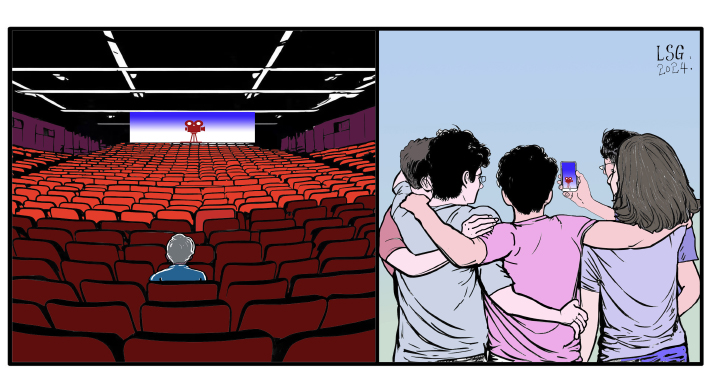| Lifestyle |
| Are Three-Minute Commentaries Destroying Movies? | |
| "As a director, I hope that the audience will see a movie in cinemas instead of watching three-minute commentaries, about which I'm really speechless," internationally renowned film director Zhang Yimou said in a recent interview | |
|
|
 (LI SHIGONG)
"As a director, I hope that the audience will see a movie in cinemas instead of watching three-minute commentaries, about which I'm really speechless," internationally renowned film director Zhang Yimou said in a recent interview. Zhang said he believes the ritual and immersive feeling brought about by watching movies in the cinema cannot be replaced by watching movie commentaries online, and calls on audiences to go to the cinema and experience in person the audio visual feast delivered by the big screen. Zhang's views on the so-called "three-minute movies" have become a trending topic on social media. The new genre, in which content creators on short-video platforms create summarized versions of films, also includes the creator's own observations. The rise of these platforms has lowered barriers to entry for aspiring movie content creators, giving rise to not only high volume and great diversity but also large discrepancies in quality. Moreover, this content sometimes infringes the copyrights of the movies it features, while also misinterpreting their plots and themes. Guan Wei (Beijing Daily): The editing process used by these content creators strips movies of their individuality. Two- or three-hour films are broken into pieces and cut to just a few minutes, allowing viewers to easily develop the illusion they have watched dozens of movies. These concentrated versions may be a good fit for fast-paced modern life and meet people's needs for efficient entertainment. However, films are not only an industry but also a form of art. Movies become classics not only because of the outline of the story, but, more importantly, because of delicate expressions of emotion, diverse camera aesthetics, as well as complex travel through time and space. Sometimes, these things can only be felt and can't be expressed in words. How can a clip of just a few minutes deliver these things? From this perspective, these short videos not only have the potential to infringe copyrights, but also rob audiences of the experience of diverse aesthetics. This may be the real reason why Zhang was left speechless. Liang Wen (Dazhong Daily): Controversies over these short videos abound. In 2021, several entertainment companies and video platforms together with hundreds of artists issued a proposal that demands short-video platforms comply with regulations on copyrighted content and remove unauthorized movie clips. The China Film Administration has announced it will carry on with its crackdown on copyright infringement and piracy while at the same time advocating the legal use of film copyrights by short videos in film promotion, commentaries and research. Some people agree with Zhang. They argue that movies are produced to high standards in terms of stories as well as audio and visual effects, so only by seeing a movie in the cinema can one really experience its beauty. Others, however, have given credit to movie commentaries, arguing that they increase the popularity and influence of good movies, helping audiences better understand them while also ruthlessly exposing bad movies, helping audiences avoid them. Audiences' decision to watch a movie in a cinema depends on their tastes. If they choose not to sit in front of the big screen, it's not necessarily the fault of movie commentaries. Copyedited by G.P. Wilson Comments to yanwei@cicgamericas.com |
|
||||||||||||||||||||||||||||||
|